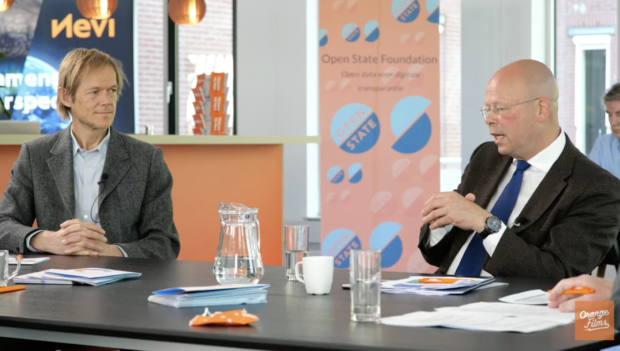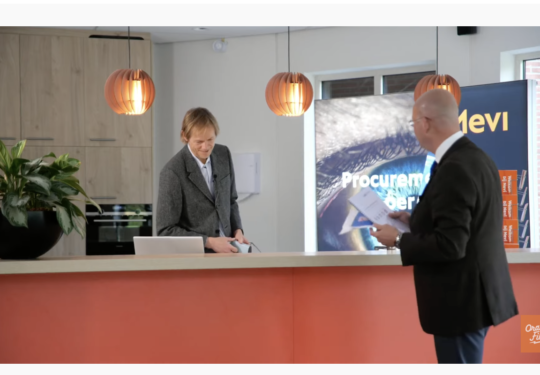On 10 May, the final event “Open Procurement in focus” took place, in which the topic of public procurement was further explored. How can we build one central platform together? And what are the wishes and information needs of external stakeholders for the development of this platform? To make this transparent, Open State Foundation presented the final report “How do we unlock procurement information? An inventory of the needs of users and re-users”. Subsequently, the panel of experts discussed which procurement information should be made public and in which way.
Presentation of the final report “How do we unlock procurement information?
Hosted by presenter Siep Eilander, André Weimar (CPO Rijk), Serv Wiemers (Director Open State Foundation), Fredo Schotanus (Professor of Public Procurement, Utrecht University), Adriana Homolova (freelance data journalist) and Haiko Brinkers (Manager Bidcenter at Canon Netherlands and active in the field of procurement data) spoke.
OSF director Serv Wiemers started the meeting with a presentation on the Open Procurement project, which OSF is carrying out in cooperation with the Ministry of the Interior, to make government procurement data public and centralise them in one place. This report presents the results of the first phase of the project: the survey among users and re-users of procurement data. The results show among others that users and re-users currently have limited access to procurement data, contract and implementation data are not published and the quality of the available data is insufficient. If the eventual Open Contract Register publishes data from all procurement phases in a timely, complete, user-friendly manner and in accordance with open data principles, all users and re-users will be able to contribute constructively and critically to the efficiency and integrity of central government procurement. Serv Wiemers explained a number of recommendations, including: facilitate all forms of reuse, publish data from the entire procurement cycle and prioritize the publication of contract data.

André Weimar then spoke about the added value for the market if more procurement data is published. The publication of a purchasing register, along with the publication of category plans and a tender calendar, gives the market insight into what they can invest in.
Adriana Homolova, independent freelance data journalist, also underlined the importance of public procurement data: procurement projects are essentially about how the government spends citizens’ tax money. She emphasised one specific wish for the promotion of journalistic research in this field: the disclosure of prizes. “Prizes and winners” is important information from contracts, but in the Netherlands this is sensitive and often omitted under the guise of “business-sensitive information”. Homolova emphasises that in other countries this is part of the public datasets.
Haiko Brinkers (Manager Bidcenter at Canon) explains this by the fact that the government often sees the publication of this data as a “must”, and information about tender data is often missing. According to their research, the contract value is known in 40% of the cases and the exact tenderers in only 0.5% of the cases. The poor quality of data is a subject that Fredo Schotanus, researcher in the field of tender data, also agrees with. “The non-disclosure of contract values, the announcement of the awarded contract, the winner, etc. makes research difficult,” Schotanus states. More transparency will also make the tendering process easier on themes such as sustainability, and it will ultimately save time if there is more transparency about these data.
Transparency throughout the entire procurement cycle
The focus of the panel discussion is on the theme of transparency regarding tender data. Brinkers emphasises that tender orders only improve if you are transparent about procurement data and that suppliers also benefit from this. “The more transparency, the better the offer you will get”. Wiemers speaks of a “culture change” that is needed for this, a change of button. Weimar, on the other hand, voices his opposition: This should be looked at per market. Filtered by market type, research must be conducted to determine how this should be handled.
One clear conclusion that can be drawn is that transparency and disclosure of procurement data and contract information promote the quality of procurement projects, the effectiveness of the procurement process and also fair competition. In addition, it contributes to the national government’s objective of promoting open government and improves the conduct of research.
